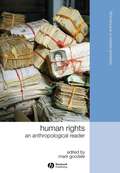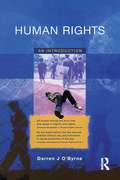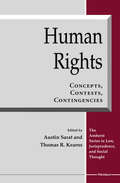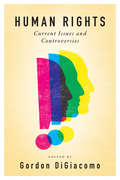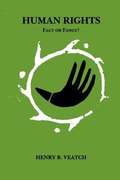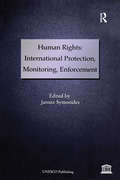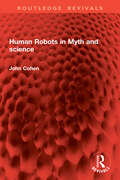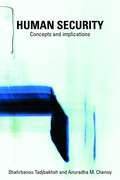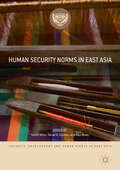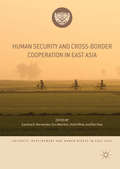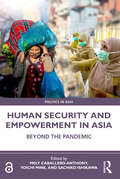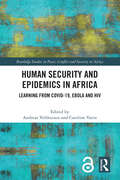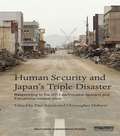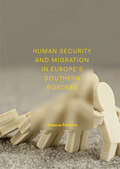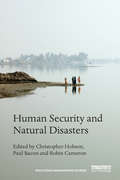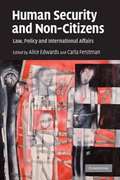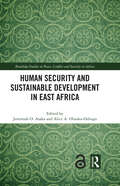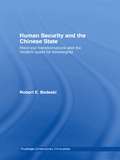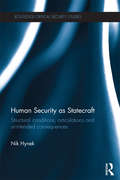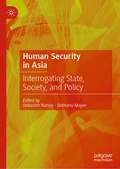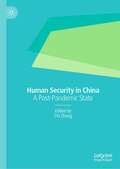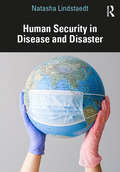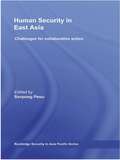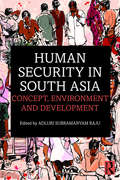- Table View
- List View
Human Rights: An Anthropological Reader
by Mark GoodaleThis innovative reader brings together key works that demonstrate the important and unique contributions anthropologists have made to the understanding and practice of human rights over the last 60 years. Draws on a range of intellectual and methodological approaches to reveal both the ambiguities and potential of the postwar human rights project. Brings together essays by both contemporary luminaries and seminal figures to provide a rich introduction to the subject. Supplemented with selected international human rights documents and links to websites on human rights.
Human Rights: An Introduction (Sociology For Globalizing Societies Ser. #5)
by Darren O'ByrneHuman Rights: An Introduction is an important text that provides a comprehensive overview of human rights and related issues from a social science perspective. First, this book does more than discuss theory, it uses case studies and personal testimonies in the debate. Human rights as an area of academic interest cannot be easily divorced from human rights struggles and the reality of contemporary conditions.Second, the book is aimed at what is an emerging and growing cross-disciplinary field of study. Human rights issues are increasingly coming to the fore in a number of academic debates. Whereas the study of human rights has traditionally been included in departments of law, international relations and philosophy, a number of courses are now being set up in departments of sociology and anthropology. Consequently, there is an increasing need to bring these disparate approaches together.
Human Rights: Concepts, Contests, Contingencies
by Austin Sarat Thomas R. KearnsToday the language of human rights, if not human rights themselves, is nearly universal. Human Rights brings together essays that attend to both the allure and criticism of human rights. They examine contestation and contingency in today's human rights politics and help us rethink some of the basic concepts of human rights. Questions addressed in Human Rights include: Can national self-determination be reconciled with human rights? Can human rights be advanced without thwarting efforts to develop indigenous legal traditions? How are the forces of modernization associated with globalization transforming our understanding of human dignity and personal autonomy? What does it mean to talk about culture and cultural choice? Is the protection of culture and cultural choice an important value in human rights discourse? How do human rights figure in local political contests and how are those contests, in turn, shaped by the spread of capitalism and market values? What contingencies shape the implementation of human rights in societies without a strong tradition of adherence to the rule of law? What are the conditions under which human rights claims are advanced and under which nations respond to their appeal?
Human Rights: Current Issues And Controversies
by Gordon DiGiacomoWritten largely by Canadian scholars for Canadian readers, this overview of contemporary human rights concerns introduces the human rights instruments—provincial, national, and international—which protect Canadians. The volume begins with an outline of the history of human rights before moving on to discuss such important topics as the relationship between political institutions and rights protection, rights issues pertaining to specific communities, and cross-cutting rights issues that affect most or all citizens. Contemporary and comprehensive, Human Rights: Current Issues and Controversies is a valuable resource for anyone interested in learning more about human rights.
Human Rights: Fact or Fancy?
by Henry B. VeatchHenry B. Veatch finds the basis for human rights in natural law. He builds his argument step by step, carefully laying the foundation for his central assertion that our basic rights are discoverable directly in the facts of nature.
Human Rights: International Protection, Monitoring, Enforcement
by Janusz SymonidesThe series of volumes prepared by UNESCO for teaching human rights at higher education level comes to a successful conclusion with the publication of this volume. Human Rights: International Protection, Monitoring, Enforcement takes an institutional approach to the international protection of human rights, examining first the United Nations system, which may be seen as universal, and then analysing regional systems of protection. An indispensable source of information on the protection of human rights, the volume can also be employed as a practical guide to the use of existing procedures in the defence of human rights.
Human Robots in Myth and science (Routledge Revivals)
by John CohenFirst published in 1966, in Human Robots in Myth and Science, the author traces the idea of the robot from antiquity until the present day (1960s) and sketches the lines of its likely development in the future. Modern science, like science fiction, is deeply concerned with the idea of a robot or self-regulating artifact which operates without human aid. Ultra rapid computers, pilotless planes, and automated factories straight away come to mind, but there are numberless other automatic devices.As John Cohen probes this exciting theme it becomes increasingly clear that the notion of a robot has had far reaching repercussions in the history of science, philosophy and literature and in the growth of industry. In his analysis of the motives of robot makers throughout the ages, the author distinguishes the impulse which challenges the gods themselves from the merely utilitarian urge. There is a vast difference between the age-old quest for technical skill and the desire to wrest from the gods the secret of making a man. The topic is treated historically, beginning with Biblical, Egyptian, Greek and other antique robots and their significance and followed by a description of the ‘man-made men’ of medieval science, alchemy and fiction. The theory of robots come into its own in the seventeenth century and its application, in craftsmanship in industry, in the eighteenth century. It is only in the recent past however, that the world of robots has begun to flourish in an ever-growing scale. In the age of AI, this historical reference work is a must read for scholars and researchers of history, philosophy and literature.
Human Security Concepts and implications: Concepts and implications (Routledge Advances in International Relations and Global Politics)
by Shahrbanou Tadjbakhsh Anuradha M. ChenoyTracing the key evolutions in the development of the concept of human security, this book explores the various definitions and critiques, how it relates to other concepts, and what it implies for polities, politics, and policy. Human security is an important subject for the whole world, in particular Asia, as it deals with interactions among fields of social change, such as development, conflict resolution, human rights, and humanitarian assistance. In a globalizing world, in which threats become trans-national and states lose power, security can no longer be studied in a one-dimensional fashion. Written by authors who are experts in this field and with case studies from different regions (Afghanistan, Central Asia and South Asia) presented throughout, this book contributes to this new multidimensional conception of security, analyses its strengths and weaknesses, and focuses on its implications for analysis and action.
Human Security Norms in East Asia (Security, Development and Human Rights in East Asia)
by Yoichi Mine Oscar A. Gómez Ako MutoThis book reveals how the idea of human security, combined with other human-centric norms, has been embraced, criticized, modified and diffused in East Asia (ASEAN Plus Three). Once we zoom in to the regional space of East Asia, we can see a kaleidoscopic diversity of human security stakeholders and their values. Asian stakeholders are willing to engage in the cultural interpretation and contextualization of human security, underlining the importance of human dignity in addition to freedom from fear and from want. This dignity element, together with national ownership, may be the most important values added in the Asian version of human security.
Human Security and Cross-Border Cooperation in East Asia (Security, Development and Human Rights in East Asia)
by Eun Mee Kim Yoichi Mine Carolina G. Hernandez Ren XiaoThis book takes up a wide variety of human security challenges beyond the dimension of human conflict, and looks at both natural and human disasters that the East Asian region faces or is attempting to resolve. While discussing various human security issues, the case studies offer practical lessons to address serious human security challenges in the framework of the ASEAN Plus Three and beyond. Against the backdrop of multifaceted globalization and parochial reactions thereto, this book is a powerful contribution to universal human security.
Human Security and Empowerment in Asia: Beyond the Pandemic (Politics in Asia)
by Mely Caballero-Anthony, Yoichi Mine, and Sachiko IshikawaIn the context of the COVID-19 pandemic, this edited volume revisits the framework of human security and development. It examines the protection-empowerment nexus as applied to various vulnerable groups and populations affected by the pandemic. While the conventional human security literature has focused on top-down protection, this book offers new perspectives on human security by exploring bottom-up empowerment from both theoretical and practical perspectives. It also encourages readers to rethink the agency of vulnerable people in addressing the challenges posed by the pandemic. Through eight case studies from Southeast Asia and Japan, the contributors to this book demonstrate the importance of empowerment in achieving human security. They focus on the responses of vulnerable groups and communities to multiple threats to their lives, livelihoods, and dignity. The chapters discuss key human security concerns, such as poverty, the environment, food, forced migration, gender, health, aging, peace, and justice – all of which have been compounded and exacerbated by the COVID-19 pandemic. An essential resource for students and scholars of human security in the aftermath of COVID-19 and its wider impacts. The Open Access version of this book, available at http://www.taylorfrancis.com, has been made available under a Creative Commons Attribution-Non Commercial-No Derivatives (CC-BY-NC-ND) 4.0 license.
Human Security and Empowerment in Asia: Beyond the Pandemic (Politics in Asia)
by Mely Caballero-Anthony, Yoichi Mine, and Sachiko IshikawaIn the context of the COVID-19 pandemic, this edited volume revisits the framework of human security and development. It examines the protection-empowerment nexus as applied to various vulnerable groups and populations affected by the pandemic.While the conventional human security literature has focused on top-down protection, this book offers new perspectives on human security by exploring bottom-up empowerment from both theoretical and practical perspectives. It also encourages readers to rethink the agency of vulnerable people in addressing the challenges posed by the pandemic. Through eight case studies from Southeast Asia and Japan, the contributors to this book demonstrate the importance of empowerment in achieving human security. They focus on the responses of vulnerable groups and communities to multiple threats to their lives, livelihoods, and dignity. The chapters discuss key human security concerns, such as poverty, the environment, food, forced migration, gender, health, aging, peace, and justice – all of which have been compounded and exacerbated by the COVID-19 pandemic.An essential resource for students and scholars of human security in the aftermath of COVID-19 and its wider impacts.The Open Access version of this book, available at www.taylorfrancis.com, has been made available under a Creative Commons Attribution-Non Commercial-No Derivatives (CC-BY-NC-ND) 4.0 license. Funded by JICA Ogata Sadako Research Institute for Peace and Development.
Human Security and Epidemics in Africa: Learning from COVID-19, Ebola and HIV (Routledge Studies in Peace, Conflict and Security in Africa)
by Caroline Varin Velthuizen, Edited by AndreasThis book examines the impact of epidemics in Africa, exploring some of the adaptation and crisis management strategies adopted to tackle COVID-19, Ebola, and HIV-AIDS. The authors reflect on lessons learned from solving complex problems and difficult decisions made by leaders on pandemic management to shape the security environment and, thus, the well-being of people living in Africa for years to come.Drawing on cases from across the continent, the book demonstrates that, significantly, during the COVID-19 pandemic, African countries and communities frequently displayed regional solidarity, creativity in decision-making, decisiveness in dealing with corruption and opportunism, and resilience and discipline in implementation. Adopting a human security framework, the authors share their lived experiences and explore the impact of epidemics on public policy decision-making, foreign policy implementation, global relations, collaboration in the community dimension, and, ultimately, the future of socio-economic development in Africa.This book will be a welcome addition for practitioners and researchers across the fields of security studies, health management, and African studies, making an essential contribution to the security discourse in a post-COVID world.
Human Security and Japan's Triple Disaster: Responding to the 2011 earthquake, tsunami and Fukushima nuclear crisis (Routledge Humanitarian Studies)
by Paul Bacon Christopher HobsonJapan has been one of the most important international sponsors of human security, yet the concept has hitherto not been considered relevant to the Japanese domestic context. This book applies the human security approach to the specific case of the earthquake, tsunami and nuclear accident that struck Japan on 11 March 2011, which has come to be known as Japan's ‘triple disaster’. This left more than 15,000 people dead and was the most expensive natural disaster in recorded history. The book identifies the many different forms of human insecurity that were produced or exacerbated within Japan by the triple disaster. Each chapter adds to the contemporary literature by identifying the vulnerability of Japanese social groups and communities, and examining how they collectively seek to prevent, respond to and recover from disaster. Emphasis is given to analysis of the more encouraging signs of human empowerment that have occurred. Contributors draw on a wide range of perspectives, from disciplines such as: disaster studies, environmental studies, gender studies, international relations, Japanese studies, philosophy and sociology. In considering this Japanese case study in detail, the book demonstrates to researchers, postgraduate students, policy makers and practitioners how the concept of human security can be practically applied at a policy level to the domestic affairs of developed countries, countering the tendency to regard human security as exclusively for developing states.
Human Security and Migration in Europe’s Southern Borders (Politics Of Citizenship And Migration)
by Susana FerreiraThis book examines the management of migratory flows in the Mediterranean within an international security perspective. The intense migratory flows registered during the year 2015 and the tragedies in the Mediterranean Sea have tested the mechanisms of the Union’s immigration and asylum policies and its ability to respond to humanitarian crises. Moreover, these flows of varying intensities and geographies represent a threat to the internal security of the EU and its member states. By using Spain and Italy as case studies, the author theorizes that the EU, given its inability to adopt and implement a common policy to effectively manage migratory flows on its Southern border, uses a deterrence strategy based on minimum common denominators.
Human Security and Natural Disasters (Routledge Humanitarian Studies)
by Christopher Hobson, Paul Bacon and Robin Cameron"Human security" is an approach that rejects the traditional prioritization of state security, and instead identifies the individual as the primary referent of security. It offers a way of broadening our perspective, and recognizing that the most pressing threats to individuals do not come from interstate war, but from the emergencies that affect people every day, such as famine, disease, displacement, civil conflict and environmental degradation. Human security is about people living their lives with dignity, being free from "fear" and "want". To date, there has been a strong tendency to focus on insecurity caused by civil conflict, with less attention on issues to do with environmental security. This volume addresses the threat posed by natural disasters, which represent an increasingly major human security threat to people everywhere. In looking at natural disasters, this book also refines the human security approach. It does so through developing its previously unexplored interdisciplinary potential. This volume explicitly seeks to bring the human security approach into conversation with contributions from a range of disciplines: development, disaster sociology, gender studies, international law, international relations, philosophy, and public health. Collectively these scholars unpack the "human" element of "natural" disasters. In doing so, an emphasis is placed on how pre-existing vulnerabilities can be gravely worsened, as well as the interconnected nature of human security threats. The book presents a variety of case studies that include the Indian Ocean tsunami, Hurricane Katrina, the 2010 Haiti earthquake, and the 2011 "triple disasters" in Japan.
Human Security and Non-Citizens: Law, Policy and International Affairs
by Alice Edwards Carla FerstmanThe past decades have seen enormous changes in our perceptions of 'security', the causes of insecurity and the measures adopted to address them. Threats of terrorism and the impacts of globalisation and mass migration have shaped our identities, politics and world views. This volume of essays analyses these shifts in thinking and, in particular, critically engages with the concept of 'human security' from legal, international relations and human rights perspectives. Contributors consider the special circumstances of non-citizens, such as refugees, migrants, and displaced and stateless persons, and assess whether, conceptually and practically, 'human security' helps to address the multiple challenges they face.
Human Security and Sustainable Development in East Africa (Routledge Studies in Peace, Conflict and Security in Africa)
by Jeremiah O. AsakaThis book investigates contemporary human security issues in East Africa, setting forth policy recommendations and a research agenda for future studies. Human security takes a people-centered rather than state-centered approach to security issues, focusing on whether people feel safe, free from fear, want and indignity. This book investigates human security in East Africa, encompassing issues as diverse as migration, housing, climate change, displacement, food security, aflatoxins, land rights, and peace and conflict resolution. In particular, the book showcases innovative original research from African scholars based on the continent and abroad, and together the contributors provide policy recommendations and set forth a human security research agenda for East Africa, which encompasses Kenya, Uganda, Tanzania, Somalia, Rwanda, Burundi, South Sudan, Sudan, Ethiopia, Eritrea, and Djibouti. As well as being useful for policy makers and practitioners, this book will interest researchers across African Studies, Security Studies, Environmental Studies, Political Science, Global Governance, International Relations, and Human Geography.
Human Security and the Chinese State: Historical Transformations and the Modern Quest for Sovereignty (Routledge Contemporary China Series)
by Robert BedeskiOffering a fresh and unique approach to surveying the historical transformations of the Chinese state, Human Security and the Chinese State focuses on human security in contrast with the twenty-first century obsession with national security. Building upon Hobbes' Leviathan, Robert Bedeski demonstrates how the sovereignty of the state reflects primary human concerns of survival, indeed, that fundamental purpose of the state is the preservation of the life of its citizens. Combining political science theory with historical literary, cinematic and sociological materials and ideas, Bedeski has produced a truly original approach to the last two thousand years of Chinese political history, explaining the longevity of the imperial Confucian state and locating the dilemma of modern China in its incomplete sovereignty.
Human Security as Statecraft: Structural Conditions, Articulations and Unintended Consequences (Routledge Critical Security Studies)
by Nik HynekThis book critically investigates the discourses and practices of human security and aims to delve below the stereotypical imageries representing them. Drawing on Foucault and Deleuze, the author approaches human security from a new perspective, with the aim of ascertaining what has been behind and underneath a certain spatio-temporal articulation of human security, and with what political implications and consequences. Each human security assemblage is composed of messy discourses and practices which are loosely related and sometimes even disconnected. This book examines the Canadian and Japanese articulations of human security and establishes the kinds of structural terrains have enabled, shaped, or blocked the unfolding of these versions of human security. The pivotal contention of the book is that Canadian and Japanese articulations of human security have been different because they have grown from completely different domestic economies of power governing the relationship between the state apparatus and the non-profit and voluntary sector. While the Canadian human security assemblage has been shaped by transformations in the country’s advanced liberal model of government, the Japanese has been shaped by the continuities of Japan’s bureaucratic authoritarianism. A novel approach is employed for the related process-tracing: a general series linking structural conditions with actual articulations of the human security projects, and their further development, including analysis of their unintended consequences. This book will be of much interest to students of Critical Security Studies, human security, global governance, foreign policy and IR/Security studies.
Human Security in Asia: Interrogating State, Society, and Policy
by Debasish Nandy Debtanu MajeeThis book discusses Human Security from a theoretical perspective. It builds theories in order to understand a phenomenon in a structured and well-ordered way. It sheds light on the conditions of the economy, food, health, community, environmental and political security in Asian states. It explores the idea of human security to understand the issues jeopardizing an individual’s security in the Asian continent and suggests policies to overcome these problems. This book argues that the nature of the government and the constitution are equally essential in ensuring the human security of a country. Some countries in Asia are not only economically vulnerable but also politically disrupted. The issues of hunger, poverty, illiteracy, militancy, terrorism, and ethnoreligious conflicts have posed threats to human security. The pandemic COVID-19 has brought a great humanitarian crisis. The role of the Asian states in combatting COVID-19 and protecting public health is highlighted in this book. With a multidimensional outlook this edited volume attempts to delineate an interdisciplinary discourse of human security in an Asian context.
Human Security in China: A Post-Pandemic State
by Chi ZhangThis book explores the emergent concept of 'human security' within the political context of COVID-19 Chinese politics. For decades, Western nations have used 'human rights' as a rubric with which to scold Chinese leaders, betraying a fundamental unwillingness to accept diversity of governance systems. As COVID-19 has demonstrated, different governance systems yield different outcomes—the freedom of circulation, speech and movement in Western democracies yielding one, and use of surveillance, lockdowns, and private–public collaboration in China and Asian societies such as Korea and Singapore yielding another. Chinese political scientists have become fixated on the notion of 'human security,' a utilitarian concept which insists on the importance of protecting and extending human life via health care, technology, and a wide range of other systems—sometimes, in ways which contradict Western notions of human rights, even as they demonstrably achieve superior outcomes for the humans involved. Being the first English language book to explore these issues, this book aims to generate a sustained theoretical relevance in the aftermath of the crisis which is likely to have lasting effects on how people live and will be of note for political scientists, China scholars, and economists.
Human Security in Disease and Disaster
by Natasha LindstaedtThis timely new textbook lays bare the ways in which disease and disaster can turn politicians into global leaders or national liabilities. It explains the impact of crises on development and human security and explores how states and societies can respond more effectively. Written primarily for the student of politics, but also drawing from public health, public policy, and environmental studies, the book investigates the threats posed by disease and disasters, and demonstrates how states can shape the ways in which these crises unfold. Case studies include: • Diseases such as Covid-19 and Ebola • Natural disasters such as Typhoon Haiyan and the 2010 Haiti earthquake • Manmade disasters such as the Yemen and Congo civil wars or famine The book delves deep into how state response to these challenges can impact political and economic stability and ends by exploring the role played by international institutions and international cooperation in addressing common challenges. This introductory textbook is perfect for undergraduate and masters courses exploring the expanding politics and human security issues surrounding disease and disasters. It will also be of interest to think tanks and policy communities looking for fresh insights to bring into professional practice.
Human Security in East Asia: Challenges for Collaborative Action (Routledge Security in Asia Pacific Series)
by Sorpong PeouSince the end of the Cold War the number of interstate wars has remained relatively low, although whilst states may be more secure than ever this does not mean that individual human beings are too. This has led to a growing recognition of the importance of human security, in contrast to the traditional realist focus on state security. This book explores human security in East Asia, focusing in particular on the challenges to collaboration among actors involved in the process of human security promotion. It examines the theoretical complexities of conceptual arguments about human security, drawing on the ideas of scholars from Asia and the West, to provide a global perspective on what causes human insecurity and how security can best be achieved. It considers in detail case studies of military interventions in East Asia, in particular East Timor, and assesses how successful collaborative efforts have been in providing human security. It also explores case studies of non-military intervention, including international criminal justice in Cambodia and East Timor. It discusses the relationship of regional great powers such as China and Japan to human security promotion, arguing that it will be better served if these powers engage less in the traditional game of geopolitics and if human security objectives do not work against actors' interests. It shows how interventions to uphold human security have not always succeeded to the extent that was hoped, despite the best of intentions, and considers how improved collaboration can be achieved, so that future interventions enjoy more consistent success.
Human Security in South Asia: Concept, Environment and Development
by Adluri Subramanyam RajuThis book delves into the theory and praxis of human security in South Asia. Home to almost a quarter of the world’s population and fast emerging markets, South Asia holds social, geopolitical and economic significance in the current global context. The chapters in the volume: examine the challenges to human security through an exploration of environmental issues including water availability, electric waste, environmental governance and climate change; explore key themes such as development, displacement and migration, the role of civil society, sustainable development and poverty; and discuss developmental issues in South Asia and provide a holistic picture of non-military security issues. Bringing together scholars from varied disciplines, this comprehensive volume will be useful for researchers, teachers and students of international relations, human rights, political science, development studies, human geography and demography, defense and strategic studies, migration and diaspora studies, and South Asian studies.
